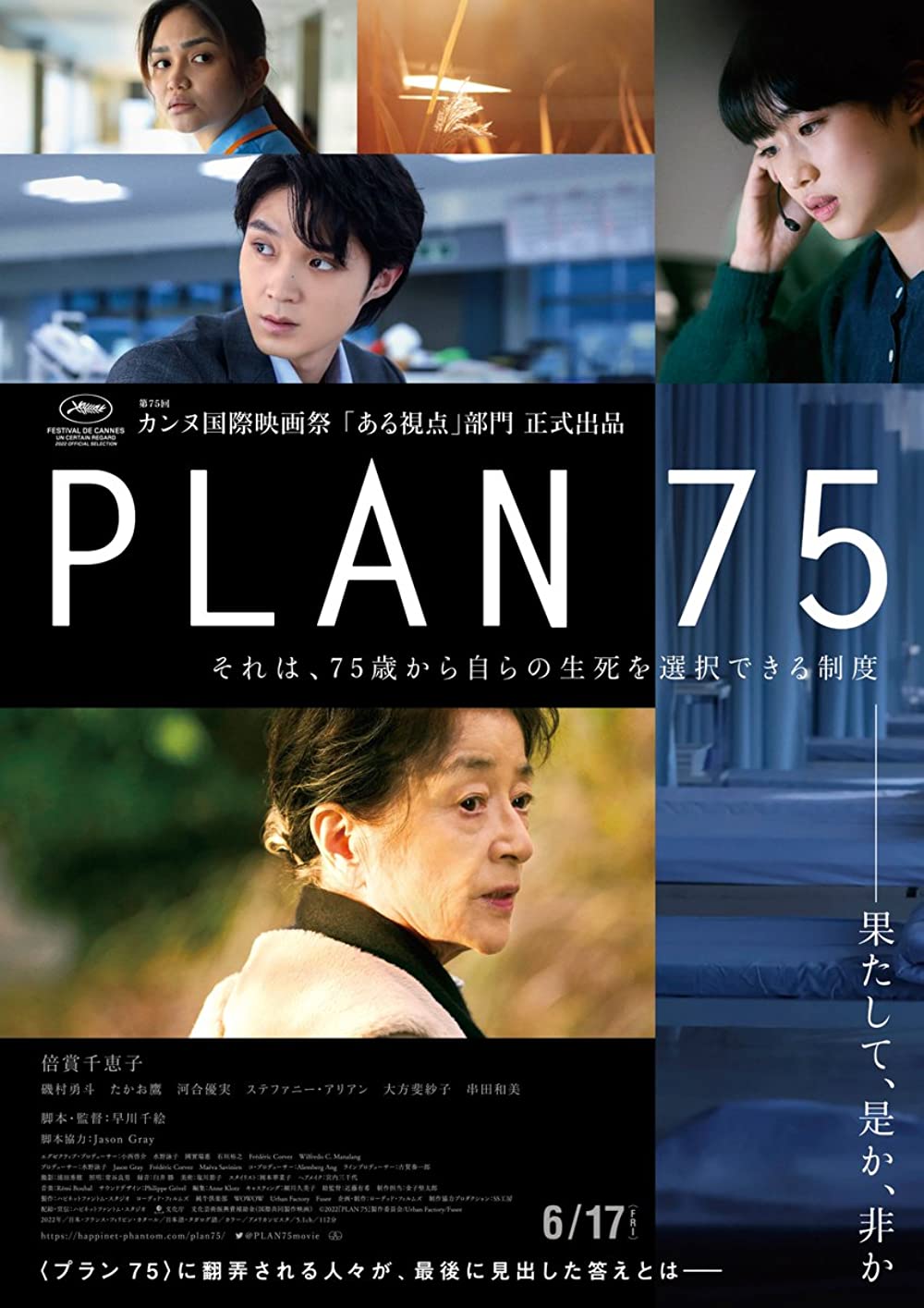
In Plan 75, the Japanese government introduces a scheme to deal with the aging population, the titular Plan 75, which will allow citizens over the age of 75 to elect to die. The incentive is complete control of your end of life circumstances, top healthcare in a comfortable state-of-the-art hospital, full funeral costs covered, including disposable of your remains, and ¥1000 stipend to use as you see fit in your last days. Despite being speculative fiction, the film is done like social realism. Most of the scenes are muted, everyday, with the crash of the emotions hidden in the ordinariness of it all.
First, let’s just get our feet planted. There is no such thing as an aging problem, only a money problem. Getting older and being of reduced productivity is a problem for capitalism, not for people. People talk about generation divides, but the only divide that matters is the class divide. As much as I love boomer jokes like anyone else, working class people a few years older than you are not the enemy. And the whole notions that this film deals with – feeling like a burden, struggling to work, being estranged from family who have either gone abroad for better jobs or knock their pan in with work so much they are too exhausted to maintain familial bonds – all revolve around a lack of money, in a world where there it is a small number of parasitical people hoarding it.
Plan 75 seems conscious of this. At one point a Plan 75 employee is working to help implement hostile design on the park benches to stop the homeless sleeping there. Then at night, in the same place, he sets up a trestle table where people can sign up to die. At all stages, the film underlines that these people are being pushed out of society. Michi, the main character, starts the film working and living independently. But when her housing is marked for demolition, and the company she works for changes its policy to no longer hire the elderly, she is forced onto social support services which are underfunded and inadequate. It is only after being backed into a corner that she considers Plan 75.
Loneliness is also a major theme of the film. While this issue is treated with particular sensitivity because Japan has a long tradition of valuing elders, I feel people can talk about the breakdown of the extended family unit in societies outside of ours in a way that is very Othering. This is an issue across the globe for very similar reasons. I grew up in the west coast of Scotland, where folk moved in two doors down from their mammy. I grew up knowing all my grandparents, my great-grandfather, my great-aunts, and even met my great-great-aunt and -uncle. The notion of loneliness in old age was entirely alien to my experience, which was of older people having folk in their house every day, family, friends and neighbours. But again, all the changes to that are economic – the factory that employed three generations of my family closed down, people my age have had to work part-time jobs over and above full-time employment just make ends meet as rent soars and affordable housing depletes, the lack money means delaying starting a family, reducing the number of children to have or having none at all. All these things mean there is no one with the time, money or energy to maintain and support those family bonds with the older generation, and fewer and fewer people to do it.
The older people in Plan 75 have family, but they are just estranged for exactly these sorts of reasons. And they are not necessarily even needing care, as I say Michi is perfectly healthy, capable of working and living on her own. But the lack of place for her in society, the constant narrative that she is a burden, is what drives her to make that decision. It is the social attitude towards the elderly that is the problem, not them themselves.
What I liked best about this film is that everyone is nice. The young man who sets up that trestle table in the park is lovely and kind to everyone he meets, hoping to help them with their problems. The young woman who takes items from the dead bodies of the elderly for her own needs, is dedicated to their care and has nothing but respect for them. The young woman who works as a call-handler and talks Michi through her decision to die, loves listening to her stories about her life and wishes she wouldn’t go through with it. No one wants this situation, but once Plan 75 has been established as a solution to a ‘problem’, it is quickly seen as the only solution to a variety of social issues. When all you have is a hammer, every problem looks like a nail.
One thing I will say, the opening scene before the title card almost looks like it belongs in a different movie. Like someone said, “Your film is gonna be really steady and understated, have something shocking to grip people up top.” But it’s unnecessary, and out of keeping with the rest of the film.
Honestly, Plan 75 is less of a What If, and more of ‘exactly how we talk about the elderly now’. Government policy is already made as though elderly lives are of lesser or no value, just look at what happened during Covid. But this film does its best work not in justifying the worth of the lives of the elderly, because they don’t need to be justified, but showing what the rest of us lose when we diminish their value.